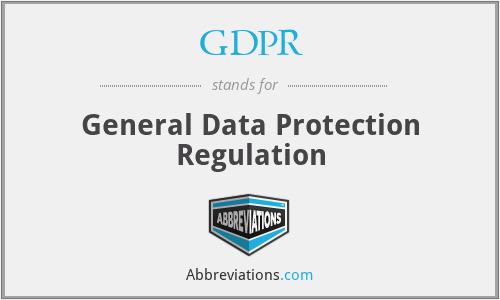What does GDPR mean in Business?
This page is about the meanings of the acronym/abbreviation/shorthand GDPR in the field in general and in the Business terminology in particular.
General Data Protection Regulation
Submitted by david_wei on September 5, 2018
Translation
Find a translation for General Data Protection Regulation in other languages:
Select another language:
- - Select -
- 简体中文 (Chinese - Simplified)
- 繁體中文 (Chinese - Traditional)
- Español (Spanish)
- Esperanto (Esperanto)
- 日本語 (Japanese)
- Português (Portuguese)
- Deutsch (German)
- العربية (Arabic)
- Français (French)
- Русский (Russian)
- ಕನ್ನಡ (Kannada)
- 한국어 (Korean)
- עברית (Hebrew)
- Gaeilge (Irish)
- Українська (Ukrainian)
- اردو (Urdu)
- Magyar (Hungarian)
- मानक हिन्दी (Hindi)
- Indonesia (Indonesian)
- Italiano (Italian)
- தமிழ் (Tamil)
- Türkçe (Turkish)
- తెలుగు (Telugu)
- ภาษาไทย (Thai)
- Tiếng Việt (Vietnamese)
- Čeština (Czech)
- Polski (Polish)
- Bahasa Indonesia (Indonesian)
- Românește (Romanian)
- Nederlands (Dutch)
- Ελληνικά (Greek)
- Latinum (Latin)
- Svenska (Swedish)
- Dansk (Danish)
- Suomi (Finnish)
- فارسی (Persian)
- ייִדיש (Yiddish)
- հայերեն (Armenian)
- Norsk (Norwegian)
- English (English)
Definition
What does GDPR mean?
- General Data Protection Regulation
- The General Data Protection Regulation (GDPR) is a regulation in EU law on data protection and privacy in the European Union (EU) and the European Economic Area (EEA). It also addresses the transfer of personal data outside the EU and EEA areas. The GDPR's primary aim is to give control to individuals over their personal data and to simplify the regulatory environment for international business by unifying the regulation within the EU. Superseding the Data Protection Directive 95/46/EC, the regulation contains provisions and requirements related to the processing of personal data of individuals (formally called data subjects in the GDPR) who are located in the EEA, and applies to any enterprise—regardless of its location and the data subjects' citizenship or residence—that is processing the personal information of data subjects inside the EEA. Controllers and processors of personal data must put in place appropriate technical and organizational measures to implement the data protection principles. Business processes that handle personal data must be designed and built with consideration of the principles and provide safeguards to protect data (for example, using pseudonymization or full anonymization where appropriate). Data controllers must design information systems with privacy in mind. For instance, using the highest-possible privacy settings by default, so that the datasets are not publicly available by default and cannot be used to identify a subject. No personal data may be processed unless this processing is done under one of the six lawful bases specified by the regulation (consent, contract, public task, vital interest, legitimate interest or legal requirement). When the processing is based on consent the data subject has the right to revoke it at any time. Data controllers must clearly disclose any data collection, declare the lawful basis and purpose for data processing, and state how long data is being retained and if it is being shared with any third parties or outside of the EEA. Data subjects have the right to request a portable copy of the data collected by a controller in a common format, and the right to have their data erased under certain circumstances. Public authorities, and businesses whose core activities consist of regular or systematic processing of personal data, are required to employ a data protection officer (DPO), who is responsible for managing compliance with the GDPR. Businesses must report data breaches to national supervisory authorities within 72 hours if they have an adverse effect on user privacy. In some cases, violators of the GDPR may be fined up to €20 million or up to 4% of the annual worldwide turnover of the preceding financial year in case of an enterprise, whichever is greater. The GDPR was adopted on 14 April 2016, and became enforceable beginning 25 May 2018. As the GDPR is a regulation, not a directive, it is directly binding and applicable, but does provide flexibility for certain aspects of the regulation to be adjusted by individual member states. The regulation became a model for many national laws outside EU, including Chile, Japan, Brazil, South Korea, Argentina and Kenya. The California Consumer Privacy Act (CCPA), adopted on 28 June 2018, has many similarities with the GDPR.
Embed
Citation
Use the citation below to add this abbreviation to your bibliography:
Style:MLAChicagoAPA
"GDPR." Abbreviations.com. STANDS4 LLC, 2024. Web. 27 Apr. 2024. <https://www.abbreviations.com/term/2018464>.



Discuss this GDPR abbreviation with the community:
Report Comment
We're doing our best to make sure our content is useful, accurate and safe.
If by any chance you spot an inappropriate comment while navigating through our website please use this form to let us know, and we'll take care of it shortly.
Attachment
You need to be logged in to favorite.
Log In